Ø1/2" Post Holders
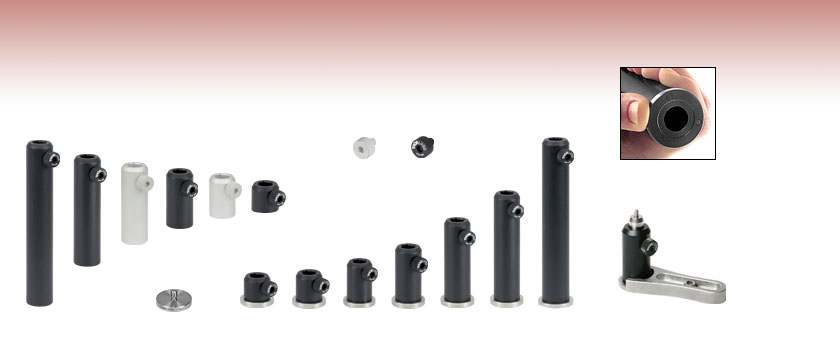
- Extra Wide Relief Cut Provides a Highly Stable Two-Line Contact with the Mating Post
- Each Post Holder Includes One Spring-Loaded or Solid Hex-Locking Thumbscrew
- Vacuum-Compatible Versions Available
Standard and Vacuum-Compatible Post Holders
Magnets in Pedestal Post Holders Provide Holding Force Before Lockdown
CF175
Pedestal Post Holders
Thumbscrews
PH2E
PH6E
PH4E
PH3E
PH2E
PH1.5E
PH1E
PH082E
BE1
Pedestal Adapter
PH6
PH4
PH3V
PH2
PH1.5V
PH1
TS25HV
TS25H
Post Holder Secured by Clamping Fork

Please Wait
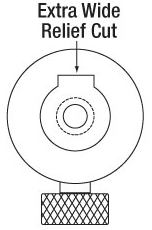
Post Holders Have an Extra Wide Relief Cut for Two-Line Contact with Ø1/2" Posts
Features
- Precision-Machined Extra Wide Relief Cut Provides Stable Two-Line Contact with Ø1/2" Posts
- Variety of Mounting Mechanisms Include Bottom-Located 1/4"-20 (M6) Tapped Hole or Magnetic Base
- Extra Thumbscrews Also Available Below
Thorlabs' Ø1/2" optical post holders are the ideal solution for mounting optical components when a specific height for a setup has not been determined. These post holders come in several styles: standard, vacuum compatible, and pedestal.
Standard Post Holders
Standard post holders can be mounted to any one of our Mounting Bases via a 1/4"-20 (M6) cap screw. Each includes a spring-loaded thumbscrew that holds the post in place before tightening.
Vacuum-Compatible Post Holders
Vacuum-compatible post holders are constructed from 6061-T6 and 2024-T3 aluminum and are compatible with our Vacuum-Compatible Mounting Bases. They are similar to our standard post holders but have a chemically cleaned finish instead of the standard black anodization. This allows them to be used directly out of the packaging at pressures as low as 10-6 Torr, or at even lower pressures with additional cleaning and processing. They also incorporate a one-piece thumbscrew instead of the standard spring-loaded design found on our other post holders.
Pedestal Post Holders
Pedestal post holders have a base that works in conjunction with the clamping forks featured below for flexible mounting options on an optical table. They incorporate high-strength magnets in the base to provide holding force while performing rough alignments. Standard post holders can also be converted to pedestal post holders using the BE1(/M) or BE1R(/M) base adapters, which are also available below.
In addition to the post holder options presented here, Thorlabs also offers swivel post holders, which have an attached swivel base, and other specialty post holders.
| Key Features | |||
|---|---|---|---|
| Type | Standard Post Holders | Vacuum-Compatible Post Holders | Pedestal Post Holders |
| Post Contact | Precision-Machined Extra Wide Relief Cut for Stability | ||
| Optical Table Mounting | Bottom-Located 1/4"-20 (M6) Tapped Hole | Compatible with CF038-P5, CF125, CF175, CF038C(/M)-P5, CF125C(/M), and CF175C(/M) Clamping Forks (Sold Below) |
|
| Thumbscrew | Spring Loaded with 3/16" (5 mm) Hex | One Piece with 3/16" (5 mm) Hex | Spring Loaded with 3/16" (5 mm) Hex |
| Vacuum Compatibility | N/A | >10-6 Torr (Lower Pressures with Additional Cleaning) | N/A |
| Construction | Black Anodized Aluminum | 6061-T6 and 2024-T3 Aluminum | Black Anodized Aluminum |
Insights into Design
Scroll down to read about a feature included in our optical post holders to enhance stability.
- Post Holders: Rectangular Channel in the Inner Bore
Click here for more insights into lab practices and equipment.
Post Holders: Rectangular Channel in the Inner Bore
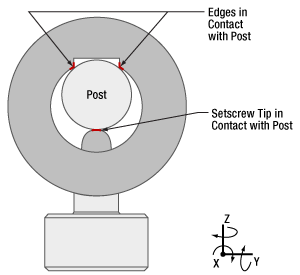
Click to Enlarge
Figure 2: Top view. The three contact locations between the post and post holder, highlighted in red, prevent the post from translating or rotating around the X or Y axes. Friction resists the post's translation and rotation around the Z axis.
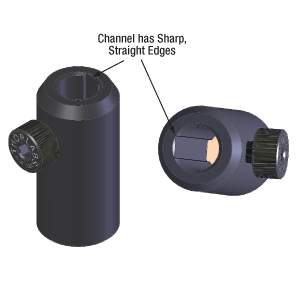
Click to Enlarge
Figure 1: A channel with sharp edges is machined into the inner bore of Thorlabs' post holders.

Figure 3: A broach, such as the one illustrated above, has a row of teeth, the next taller than the previous. With the teeth in contact with the material, a machine pulls the broach across the surface. Each tooth removes a small amount of material, and the depth of the channel created by the broach equals the overall difference in tooth height.
All of Thorlabs' post holders include a channel, with straight parallel edges, running the length of the inner bore (Figure 1). Tightening the setscrew pushes the post against the two edges of the channel (Figure 2). Since the edges of the channel are separated by a wide distance, approximately half the inner diameter of the post holder, the seating of the post against the channel's edges is stable and repeatable.
Contact with the two edges of the channel eliminates four of the post's six degrees of freedom, since the edges block the post from translating along or rotating around either the Y or Z axis. In addition, the friction between the side of the post and the edges of the channel resists the post's movement along and around the X axis, which are the post's two remaining degrees of freedom.
Without the channel in the inner bore, there would be a single line of contact between the post and post holder. The position of the post would not be stable, since the post would be free to rotate around the Z axis and shift along the Y axis.
Even if this instability resulted in submicron-scale unwanted shifts in each component's position in an optical setup, the cumulative effect could have a significant negative impact on system performance. In addition, more frequent realignment of the system could be required.
Broaching
The channel's edges must be straight and free of bumps and roughness to hold the post stable. These post holders have straight, sharp edges when examined on a micron scale. If the edges are not completely linear, the post might rock in the holder, and / or it may not be possible to repeatably position the post in the holder.
The smooth, straight edges of the channel are achieved using a machining process called broaching. A broach (Figure 3) resembles a saw whose teeth increase in height along its length.
As the broach is pulled along a surface, each tooth removes a small amount of material. The total depth of the channel cut by the broach equals to the overall difference in tooth height (H2 - H1).
Compared with other approaches for creating channels, broaching is preferred due to its ability to provide straight profiles while being compatible with high-volume production.
Date of Last Edit: Dec. 11, 2019
| Posted Comments: | |
Sally Otago
(posted 2022-10-25 20:12:18.333) Hello,
I would like to know if we can get the posts without the magnets as well? As for some purpose having magnets are not that good around the experiment.
Many thanks,
Regards YLohia
(posted 2022-10-28 04:44:42.0) Hello, thank you for contacting Thorlabs. The PH082E (or similar) post holders can be configured as non-magnetic post holders by combining the stock PH1 post (or similar) with the BE1 studded base adapter. Paul Stonaha
(posted 2020-04-30 17:00:45.293) It seems like the mounting hole in the base of the postholder is not colinear with the center of an inserted and tightened post (according to your .step files). The discrepancy in the alignment is 0.05mm. Is this correct? If so, it means building an accurate setup - one that is fastened to an optic table using set screws in the post holders - requires ensuring that the knobs are all facing the same direction. llamb
(posted 2020-05-04 03:22:07.0) Thank you for your feedback. You are correct about the 0.05 mm nominal difference between post and post holder concentricity. Keep in mind that manufacturing tolerances on the post's outer diameter and the post holder's inner bore will be greater than this nominal difference anyway. In practice, if a small difference like 0.05 mm is a concern for your application, I would recommend some translation or kinematic mount to account for this. The reason there is a 0.05 mm nominal difference is that the post's outer diameter and post holder's inner bore are different in size by this value to allow for easy post insertion and prevent possible sticking. To manufacture the post holder without increasing manufacturing costs significantly, we must make the central bore concentric with the outer diameter of the post holder (and not offset by 0.05 mm as a post compensation), and thus the post and post holder's diameter differences will not allow an absolute perfect concentricity. I have reached out to you directly to discuss your application further. Andrey Kuznetsov
(posted 2019-06-12 21:12:36.573) For all PH series, standard post holders, please adjust your assembly process for epoxying the brass bottom into the post holder to make sure that all brass pieces sit flush with the bottom of the post holder. The issue is that when using 2 post holders with long post, for stability it is desirable to bottom out both posts. When the brass pieces sitting inside the post holder are not at the same height, then one optical post will sit higher than another, thus causing leveling issues. Cannot raise a post because for stability & repeatability purposes it needs to bottom out. llamb
(posted 2019-06-15 09:15:08.0) Thank you for your feedback. The post plug is threaded into the main body until it meets the end of the internally threaded bore at the bottom of the main body, and then backed out by a 1/4 turn. Given this and the bore length tolerances, there should be <0.6 mm of a difference with the height of the post plug's top surface. As an alternative, you can also consider the BE1 pedestal base with a clamping fork. I have reached out to you directly to quantify the height differences you've noticed. user
(posted 2015-09-30 12:53:55.707) Could you please sell 25mm metric post holders (PH25/M). You used to sell metric versions of the 1" high posts, which were really convenient. Often the 20mm are too short to provide any height adjustment and the 30mm are too high for many of our applications. besembeson
(posted 2015-10-08 02:58:30.0) Response from Bweh at Thorlabs USA: Thanks for the feedback. We offer the 20mm and 30mm versions with the hope that the various TR series post lengths (http://www.thorlabs.com/newgrouppage9.cfm?objectgroup_ID=1266) will add flexibility to cover several height requirements for most applications. user
(posted 2014-02-24 17:46:10.957) Do you have a vacuum compatible post? Wondered how we can use the vacuum compatible post holder? cdaly
(posted 2014-02-25 05:58:33.0) Response from Chris at Thorlabs: Thank you for your inquiry. The TR series of posts are somewhat vacuum compatible as they are now as they are made of 303 stainless steel. The only issue is that a small amount of gas may become trapped when the stud is threaded into the top of the post. Ideally, the tapped hole and stud should have a way to vent. These are on our list of standard optomechanics which we will be adding vacuum compatible versions of in the near future. cdaly
(posted 2012-11-30 16:23:48.81) Response from Chris at Thorlabs: Thank you for using our feedback feature. We are unable to provide 2010 SolidWorks files directly as the version we use for design (2012) restricts us from creating backwards compatible files, but we do have Step files available for download as well. These files can be opened in SolidWorks 2010 and then saved as an .sldprt file, which will give you the format you require. xiaoqiang026403
(posted 2012-11-29 01:43:38.617) I use SolidWorks 2010,but some of your products' Drawing and Documents (SolidWorks) are opened by SolidWorks 2012. Could you send the SolidWorks Documents in version 2010? bdada
(posted 2012-02-02 19:08:00.0) Response from Buki at Thorlabs:
The post holder is made from aluminum, which is non magnetic. This information is included in the overview of the product on the web page. Please contact TechSupport@thorlabs.com if you want to discuss your application further. shane
(posted 2012-02-02 17:13:49.0) Could you tell me what materials are used in these post holders? We have an application for which we need non-magnetic parts. Could you suggest another product if these wouldn't work? Thanks. Tyler
(posted 2008-07-02 08:06:32.0) A response from Tyler at Thorlabs to aidi: The PH1E and other post holders in that series can be secured to an optical breadboard using either a CF125 or a CF175 clamping fork. Thank you for your feedback; your comment allows us to improve our web presentation so that all of the future viewers of this page will have a clearer understanding of our product line. aidi
(posted 2008-07-01 22:05:12.0) Please suggest me what item should I have to fix this post holder to the breadboard. Thank you. |

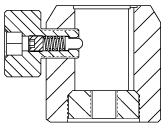
Click to Enlarge
Standard Post Holders Include a Spring-Loaded Thumbscrew that Holds Posts in Place Before Tightening
- Aluminum, Spring-Loaded, Hex-Locking Thumbscrew (3/16" or 5 mm) for Positioning Ease
- Extra Wide Relief Cut Provides a Two-Line Stable Contact for Post
- 1/4"-20 (M6) Tapped Hole on Bottom
- Packs of 5 Also Available for 1" to 4" Lengths (20 mm to 100 mm)
These standard post holders are designed with a wide, square relief cut that provides two lines of contact for highly stable post mounting. A spring-loaded plunger within the aluminum thumbscrew holds a steel post firmly within the post holder prior to final tightening. This design allows one-handed positioning of post-mounted devices. Thorlabs' imperial and metric post holders are equipped with our 3/16" (TS25H) and 5 mm (TS6H/M) spring-loaded hex-locking thumbscrews, respectively (also available separately below). These thumbscrews should not be tightened beyond the maximum torque of 28 in·lbs (3.2 N·m). The post holders are compatible with our entire line of table bases and the BE1(/M) and BE1R(/M) base adapters (sold separately below).
Popular post holders are also available in packages of five for ease of ordering.

| Vacuum Compatibility Specifications | |
|---|---|
| Vacuum Compatibility as Packageda |
>10-6 Torr |
| Materials | 6061-T6 and 2024-T3 Aluminum 353NDPK Epoxyb Low Vacuum Pressure Grease |
| Preparation and Packaging |
Chemically Cleaned and Double Vacuum Bagged |
| Additional Vacuum Compatibility Information |
Grease Vapor Pressure: 10-13 Torr at 20 °C, Epoxy Meets Low Outgassing Standards NASA ASTM E595 and Telcordia GR-1221 |
- Vacuum-Compatible, Unanodized Design (>10-6 Torr)
- Double Vacuum Bagged for Cleanroom Environments
- One-Piece Thumbscrew for Reduced Outgassing
- Extra Wide Relief Cut Provides a Two-Line Stable Contact for Post
- 1/4"-20 (M6) Tapped Hole on Bottom
These vacuum-compatible post holders are constructed from 6061-T6 and 2024-T3 aluminum and are designed with a wide, square relief cut that provides two lines of contact for highly stable post mounting. They are compatible with our vacuum-compatible post holder bases.
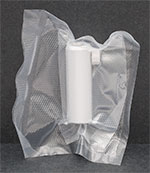
Click to Enlarge
These post holders are packaged inside a double vacuum bag.
Our vacuum-compatible post holders are chemically cleaned and prepared for vacuum applications before packaging. They are compatible directly out of the packaging with vacuum environments down to 10-6 Torr. With additional cleaning and processing, they can be used at even lower pressures, only limited by the outgassing rate of the aluminum, epoxy, and grease. The material properties of the 6061-T6 and 2024-T3 aluminum and the cleaning methods that are completed by the end user should be used to determine the appropriateness of these products and materials in a specific vacuum system operating at pressures under 10-6 Torr.
Our vacuum-compatible post holders are packaged in double airtight bags for cleanroom and vacuum chamber applications. The imperial and metric post holders are equipped with our 3/16" (TS25HV) and 5 mm (TS6HV/M) vacuum-compatible hex-locking thumbscrews, respectively (also available separately below).
Please note that we do not recommend using an L wrench hex key to tighten the thumbscrews included with these post holders, as this may break off the screw head. The recommended maximum torque is 28 in·lbs (3.2 N·m).
We also offer additional vacuum-compatible Ø1/2" post system components.

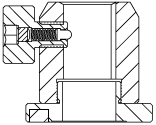
Click to Enlarge
Pedestal Post Holders Include a Spring-Loaded Thumbscrew that Holds Posts in Place Before Tightening
- Aluminum, Spring-Loaded, Hex-Locking Thumbscrew (3/16" or 5 mm) for Positioning Ease
- Three High Strength Magnets in Base Provide Holding Force Prior to Fastening
- Extra Wide Relief Cut Provides a Two-Line Stable Contact for Post
- Post can Pass Through Base Allowing Minimal Beam Height
Thorlabs' pedestal-style post holders combine the versatility of our standard post holders with the small footprint of the pedestal and fork design. The post holder can be locked down to an optical breadboard using a CF series clamping fork (see below). The fork can be swiveled 360° to pick the most convenient mounting hole. To further enhance this mounting system, magnets have been added to allow temporary positioning of the post holder prior to lockdown. The through hole design allows the maximum range of post height adjustment. Thorlabs' imperial and metric Pedestal-Style Post Holders are equipped with our 3/16" (TS25H) and 5 mm (TS6H/M) spring-loaded-hex locking thumbscrews, respectively (available below). These thumbscrews should not be tightened beyond the maximum torque of 28 in·lbs (3.2 N·m).
To order these pedestal post holders without magnets, please contact Tech Support.

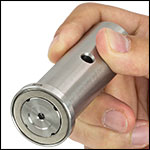
Click to Enlarge
The BE1R has a magnet in the base for stability in temporary setups.
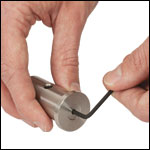 Click to Enlarge
Click to EnlargeThese base adapters feature a 1/8" (3 mm) hex socket on the bottom for tightening.
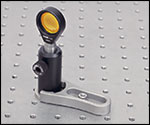 Click to Enlarge
Ø1/2" Post Holder Mounted to an Optical Table Using a CF125 Clamping Fork and BE1 Base Adapter
Click to Enlarge
Ø1/2" Post Holder Mounted to an Optical Table Using a CF125 Clamping Fork and BE1 Base Adapter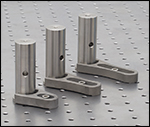
Click to Enlarge
Several Slot Lengths Available
- BE1(/M) and BE1R(/M) Adapters Convert Standard Ø1/2" Post Holders and Ø1" Post Extensions into Pedestal-Style Mounts
- Clamping Fork or CL8 Table Clamp Secures Pedestal-Style Mount to a Breadboard or Optical Table
- Three Sizes Provide Clamping with 1/4"-20 (M6) Cap Screws
- 0.40" (10.2 mm) Long Counterbored Slot [CF038-P5 and CF038C(/M)-P5]
- 1.24" (31.5 mm) Long Counterbored Slot [CF125 and CF125C(/M)]
- 1.75" (44.4 mm) Long Counterbored Slot [CF175 and CF175C(/M)]
- Swivel Fork 360° to Select Most Convenient Mounting Hole
- CF038C(/M)-P5, CF125C(/M), and CF175C(/M) Each Include a 1/4"-20 (M6)-Threaded Captive Screw
- BE1(/M) and All Clamping Forks Available in Packs of Five [CF038-P5 and CF038C(/M)-P5 Not Sold Individually]
Pedestal Base Adapters
The BE1(/M) pedestal base adapter features a 1/4"-20 (M6)-threaded stud, that fits into the bottom of our standard Ø1/2" post holders or Ø1" post extensions to convert them into pedestal-style mounts for added stability. The BE1R(/M) adapter has a magnet in the base that is sufficiently strong to securely hold the base in place without clamping to an optical table (see photo at the top right). Made from solid 303 stainless steel with a 1.25" (31.8 mm) outer diameter, these adapters allow our standard Ø1/2" post holders to be used with the clamping forks sold below.
The BE1(/M) base adapter is available in a pack of five for ease of ordering.
Clamping Forks
These clamping forks are designed to provide exceptional clamping force when used with our Ø1/2" post holders and Ø1" post extensions that have been adapted using the BE1(/M) to pedestal-style mounts. They can also be used with our pedestal-style Ø1/2" post holders or Ø1" pedestal posts without any need for the BE1(/M).
Fabricated from solid 303 stainless steel, all of these clamping forks create three points of contact with the table for high stability. For flexibility in the positioning of post assemblies, the CF038-P5 and CF038C(/M)-P5 forks have 0.40" (10.2 mm) long counterbored slots, the CF125 and CF125C(/M) forks have 1.24" (31.5 mm) long counterbored slots, and the CF175 and CF175C(/M) forks have 1.75" (44.4 mm) long counterbored slots. The counterbored slots on the CF038-P5, CF125, and CF175 forks are designed for user-supplied 1/4"-20 (M6)-threaded cap screws. For further convenience, the CF038C(/M)-P5, CF125C(/M), and CF175C(/M) forks each include a 1/4"-20 (M6)-threaded captive screw. Please note that significant over tightening of clamping forks can deform the surface of an optical table, which can cause misalignment of components and decrease stability.
Our clamping forks are also available in packages of five for ease of ordering (note: the CF038-P5 and CF038C(/M)-P5 clamping forks are only available in packs of five).

- Convert Your Existing Post Holders into Universal Post Holder Style Mounts
- 360° Swiveling Base Fastens to Existing Ø1/2" Post Holders via a 1/4"-20 (M6) Cap Screw
- Magnets in Base Hold Position of Components on Breadboard During Initial Setup
- Also Available in Packs of Five
Our 360° swivel base adapter fits standard Ø1/2" post holders with 1/4"-20 (M6) mounting holes and minimizes the amount of time it takes to assemble an optical system. In addition, the swivel design is ideal for applications that require a large number of components to be packed into a small area. When our Ø1/2" post holders are used with this adapter, the combination is nearly that of our very popular Universal Post Holders. This anodized aluminum adapter has the benefit of compatibility with any of our existing Ø1/2" post holders but does not offer the same height flexibility of the swiveling post holders, which allow the post to be lowered all the way to the table. For ease of ordering, these base adapters are also available in packs of five.

| Specification | |
|---|---|
| Maximum Torquea | 28 in·lbs (3.2 N·m) |
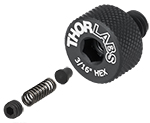
Click to Enlarge
Exploded View of the TS25H Thumbscrew
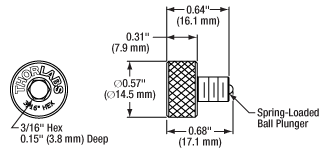
TS25H Drawing
These hex-locking, anodized aluminum thumbscrews have spring-loaded, completely retractable Delrin®* tips that provide sufficient force on a post to hold it in place as final positional adjustments are being made. They can then be locked into place using a 3/16" (for the TS25H) or 5 mm (for the TS6H/M) balldriver to prevent any further movement of the post. The hex size is also engraved on the face of the thumbscrew, thereby enabling easy identification in the lab.
The TS25H has 1/4"-20 threads while the TS6H/M has M6 x 1.0 threads for compatibility with our imperial and metric Ø1/2" post holders, respectively. The recommended maximum torque is 28 in·lbs (3.2 N·m). Please note that we do not recommend using an L wrench to tighten the thumbscrew, as this may break off the screw head.
If a thumbscrew without a spring-loaded tip is preferred, we recommend our vacuum-compatible thumbscrews, sold below. Alternatively, the tips can be removed from these thumbscrews by unthreading the setscrew in the front of the thumbscrew with a 1/16" (1.5 mm) balldriver. The spring and tip can then be removed from the thumbscrew, in the order shown in the image to the right. However, the resulting contact face of the thumbscrew will have a center hole, unlike the contact face of our vacuum-compatible thumbscrews.
For ease of ordering, these thumbscrews are available individually or in packages of five.
*Delrin® is a registered trademark of DuPont Polymers, Inc.

| Specifications | |
|---|---|
| Vacuum Compatibility as Packageda |
>10-6 Torr |
| Materials | 2024-T3 Aluminum |
| Preparation and Packaging | Chemically Cleaned and Double Vacuum Bagged |
| Maximum Torqueb | 28 in·lbs (3.2 N·m) |
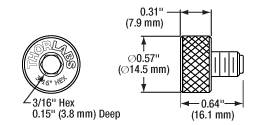
TS25HV Drawing
These hex-locking thumbscrews are constructed from 2024-T3 aluminum and chemically cleaned and prepared for vacuum applications before packaging. They are compatible directly out of the packaging with vacuum environments down to 10-6 Torr. With additional cleaning and processing, they can be used at even lower pressures, only limited by the outgassing rate of the aluminum. The material properties of the 2024-T3 aluminum and the cleaning methods that are completed by the end user should be used to determine the appropriateness of these products and materials in a specific vacuum system operating at pressures under 10-6 Torr.
These unanodized thumbscrews are packaged in double airtight bags for cleanroom and vacuum chamber applications.
The thumbscrews may be adjusted using our selection of balldrivers. The TS25HV has 1/4"-20 threads while the TS6HV/M has M6 x 1.0 threads for compatibility with our imperial or metric Vacuum-Compatible Ø1/2" Post Holders, respectively. We also offer additional vacuum-compatible Ø1/2" post system components.
 Products Home
Products Home














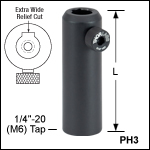
 Zoom
Zoom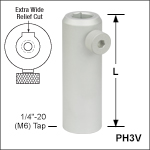

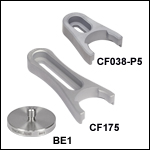
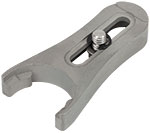
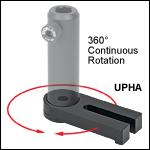
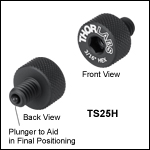
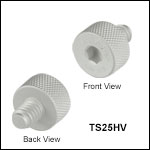
 Ø1/2" Post Holders
Ø1/2" Post Holders